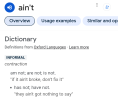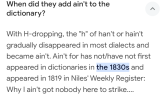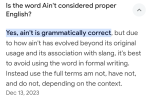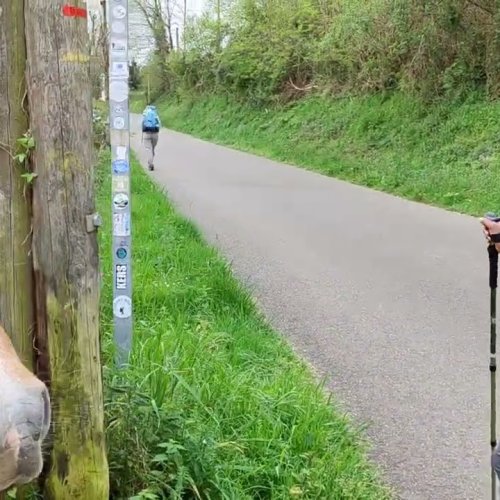I wish it were possible to say that plurals never need an apostrophe. But we have to make an exception for the plural of letters, if only to avoid confusion. If I ask: How many is in 'imitate'? or How many as in 'aardvark'? or How many us in ululate? you'd have to read those questions twice, I bet. There would not be the same problem with How many es in separate? or How many os in 'horizon' (why did that word come to mind so readily?), though they do look a bit odd. Once you make the exception for the plurals of a, i, and u, it would look odd to write 'Dot your i's and cross your ts. So I think we have to allow the apostrophe in the plural of all letters.I beg to differ.The lower case would be a confusing "ss". I have consulted trusty Mr. Fowler, who writes, regarding the non-possessive 's:
"it may occasionally be used before a plural s as a device for avoiding confusion, but this should not be extended beyond what is necessary for that purpose. We may reasonably write dot your i's and cross your t's, but there is no need for an apostrophe in but me no buts or one million whys, or for the one we sometimes see in such plurals as M.P.s, A.D.C.s, N.C.O.s, the 1920s, etc.."
I had to stop and ponder over "but me no buts".
-
For 2024 Pilgrims: €50,- donation = 1 year with no ads on the forum + 90% off any 2024 Guide. More here.
(Discount code sent to you by Private Message after your donation)
Search 69,459 Camino Questions
You are using an out of date browser. It may not display this or other websites correctly.
You should upgrade or use an alternative browser.
You should upgrade or use an alternative browser.
What are your favorite Camino misspellings on the forum?
- Thread starter peregrina2000
- Start date
A selection of Camino Jewellery
- Time of past OR future Camino
- Too many and too often!
In Llanberis in north Wales there is (or was) an outdoor shop run by a Kiwi. He had a small basket of metal spikes which was labelled "tint pigs"....I cringed every time Peg's name was used on our trip to New Zealand.
I might have missed it, but I haven't seen O'Cebreiro mentioned. Put that one with O'Pedrouzo, which isn't mentioned as often. [Edit: Sorry! Yes, post #4. I was skimming the pages. Thanks to chinacat and Kirkie.]
What really, really, annoys me is that bit about English being an ever-evolving language. Once more than 50% of people make the same mistake, the mistake becomes accepted, and what was 'right' becomes 'wrong'. Even dictionaries are forced to accept the misuse. Listen to the number of people who pronounce 'dissect' to rhyme with 'bisect', the number of people who use 'epicentre' because it sounds cleverer than 'centre', the people who want to live life to the 'fullest', the people who think that there is a 'bacteria' and a 'criteria'. These are probably not relevant to this thread, but I just wanted to mention them. But 'I had a panini' might be seen, or you might see a chalkboard on the camino with a list of "panini's"
What really, really, annoys me is that bit about English being an ever-evolving language. Once more than 50% of people make the same mistake, the mistake becomes accepted, and what was 'right' becomes 'wrong'. Even dictionaries are forced to accept the misuse. Listen to the number of people who pronounce 'dissect' to rhyme with 'bisect', the number of people who use 'epicentre' because it sounds cleverer than 'centre', the people who want to live life to the 'fullest', the people who think that there is a 'bacteria' and a 'criteria'. These are probably not relevant to this thread, but I just wanted to mention them. But 'I had a panini' might be seen, or you might see a chalkboard on the camino with a list of "panini's"
Last edited:
Down bag (90/10 duvet) of 700 fills with 180 g (6.34 ounces) of filling. Mummy-shaped structure, ideal when you are looking for lightness with great heating performance.
€149,-
€149,-
I might have missed it, but I haven't seen O'Cebreiro mentioned. Put that one with O'Pedrouzo, which isn't mentioned as often.
What really, really, annoys me is that bit about English being an ever-evolving language. Once more than 50% of people make the same mistake, the mistake becomes accepted, and what was 'right' becomes 'wrong'. Even dictionaries are forced to accept the misuse. Listen to the number of people who pronounce 'dissect' to rhyme with 'bisect', the number of people who use 'epicentre' because it sounds cleverer than 'centre', the people who want to live life to the 'fullest', the people who think that there is a 'bacteria' and a 'criteria'. These are probably not relevant to this thread, but I just wanted to mention them. But 'I had a panini' might be seen, or you might see a chalkboard on the camino with a list of "panini's"
See post # 4 (et al.) in this thread
witsendwv
Active Member
- Time of past OR future Camino
- (2015)
My husband's sister taught Italian at a university and spoke Sicilian as well. When my son was in middle school he wrote a term paper and asked her whether to use panino or panini. She told him that while panino was correct in the context in which he was using the word he could use panini as that is what the sandwich has come to be called in the US. His English teacher disagreed!!!But 'I had a panini' might be seen, or you might see a chalkboard on the camino with a list of "panini's"
- Time of past OR future Camino
- CF 2006, CP 2013, Salvador2017,
Inglés 2019
See post 4I might have missed it, but I haven't seen O'Cebreiro mentioned. Put that one with O'Pedrouzo, which isn't mentioned as often.
What really, really, annoys me is that bit about English being an ever-evolving language. Once more than 50% of people make the same mistake, the mistake becomes accepted, and what was 'right' becomes 'wrong'. Even dictionaries are forced to accept the misuse. Listen to the number of people who pronounce 'dissect' to rhyme with 'bisect', the number of people who use 'epicentre' because it sounds cleverer than 'centre', the people who want to live life to the 'fullest', the people who think that there is a 'bacteria' and a 'criteria'. These are probably not relevant to this thread, but I just wanted to mention them. But 'I had a panini' might be seen, or you might see a chalkboard on the camino with a list of "panini's"
3rd Edition. More content, training & pack guides avoid common mistakes, bed bugs etc
- Time of past OR future Camino
- Most years since 2012
I do.Listen to the number of people who pronounce 'dissect' to rhyme with 'bisect',
You do listen to people who pronounce 'dissect' to rhyme with 'bisect', or you do pronounce 'dissect' to rhyme with 'bisect'? If you are in the latter camp, you can take comfort in the number of dictionaries that allow that pronunciation. I quote Adam Kay (author of "This is Going to Hurt"), "'DISS-ection', as our anatomy lecturer taught us on day one: 'Diss as in piss, not dice as in lice.'" (Undoctored, Adam Kay). If you are in that latter camp, I hope that you spell the word correctly. Not that it's a word that you are likely to write very often, unless you are a surgeon.I do.
- Time of past OR future Camino
- Most years since 2012
Yes, I'm in this camp and am much relieved by this acceptanceIf you are in the latter camp, you can take comfort in the number of dictionaries that allow that pronunciation.
Join our full-service guided tour and let us convert you into a Pampered Pilgrim!
- Time of past OR future Camino
- 1989, 2016, 2018, 2023, 2024...
I can't agree with you on this. Not because I disagree, but because it would be a misuse of the word "with", which we all know means "against" and has for over a thousand years. Any usage with the sense "on the same side as" is a misuse that the dictionaries have been forces to accept, just because the majority of speakers are making the same mistake. Right has become wrong and mið has become wið.What really, really, annoys me is that bit about English being an ever-evolving language. Once more than 50% of people make the same mistake, the mistake becomes accepted, and what was 'right' becomes 'wrong'. Even dictionaries are forced to accept the misuse.
Also note that I was not fast to point this out, because "fast" in the sense of "quickly moving" is a misuse of the word "fast" which means the opposite "immobile".
- Time of past OR future Camino
- April 2023
If there isn’t a written accent, then there is a pattern to which syllable gets stressed. In words that end with a vowel or the consonant -n or -s, the stress is on the second to last syllable. With any other consonant, the stress is on the last syllable. Any stress that breaks that rule requires a written accent. Written accents are only found on vowels (á, é, í, ó, ú) and there can only be one of them per word.I rely on generally knowing how to pronounce words to be able to back-calculate where to put the accents in written Spanish.
The ñ is technically an accent but doesn’t count in the “one per word” thing, it means you pronounce the letter like “ny” (or like the “gn” in lasagna).
There are a few other accents things (like when do you hear the “u” after a “g”, certainly not in the word guitar but yes in the word penguin: guitarra, pingüino) but I won’t get into that now, we probably won’t meet too many penguins on Camino.
HBS60
Active Member
- Time of past OR future Camino
- August 2024 (planned)
Sometimes it’s hard to know if the accent is not present because it’s not supposed to be there or because it was forgotten or omitted due to laziness. I’ve always been a stickler for accents but I type mostly on an English keyboard, having to do something extra like long press to type the accented letter and it’s easy to forget, autocorrect doesn’t always catch it. It’s not a problem if I’m familiar with the word, but once in a while I have to ask. I’m not from Spain, so I wasn’t sure if Sarria was pronounced that way or whether an accent over the i has been omitted, as in Sarría (as I understand it, it’s the first one). I’m an amateur musician, and I came up upon the title of an Afro-Cuban Dance called Danza Lucumi. Pronounced as just written didn’t sound right, particularly since it was an American printed score, the American typeset doesn’t have accents (sometimes they do but I’ve seen so many mistakes so I don’t trust them). The correct spelling is Danza Lucumí, with an accent on the i. Another situation is when a word is in all caps, because we usually omit the accent on capitalized letters (eg, ángel and Angel, you can put the accent as it’s supposed to but Ángel seems less common to me)If there isn’t a written accent, then there is a pattern to which syllable gets stressed. In words that end with a vowel or the consonant -n or -s, the stress is on the second to last syllable. With any other consonant, the stress is on the last syllable. Any stress that breaks that rule requires a written accent. Written accents are only found on vowels (á, é, í, ó, ú) and there can only be one of them per word.
The ñ is technically an accent but doesn’t count in the “one per word” thing, it means you pronounce the letter like “ny” (or like the “gn” in lasagna).
There are a few other accents things (like when do you hear the “u” after a “g”, certainly not in the word guitar but yes in the word penguin: guitarra, pingüino) but I won’t get into that now, we probably won’t meet too many penguins on Camino.
When I was growing up, ñ was considered a separate letter, and ch was considered a separate letter, so when reciting the alphabet, we would say a,b,c,ch,d,h…m,n,ñ,o,p…. I believe the tilde you see in Portuguese in letters like ã like São Paulo might be considered accents, but I don’t know. I don’t know if things have changed it the 50+ years since I learned these things.
The umlaut over the ü is to make sure the “u” sound gets pronounced when it would otherwise be silent, as in pingüino, or words like vergüenza, güiri, etc, but it’s very rare and easy to forget.
Last edited:
Technical backpack for day trips with backpack cover and internal compartment for the hydration bladder. Ideal daypack for excursions where we need a medium capacity backpack. The back with Air Flow System creates large air channels that will keep our back as cool as possible.
€83,-
€83,-
- Time of past OR future Camino
- Francés, Norte, Salvador, Primitivo, Portuguese
I believe that it is still considered a separate letter - at least that's what Wikipedia says.When I was growing up, ñ was considered a separate letter

Ñ - Wikipedia
and
Alphabet/Spanish alphabet - Wikiversity
- Time of past OR future Camino
- Recent:Norte/Muxia- Spring '23
MadridWay- Fall '23
- Time of past OR future Camino
- 2012, 2015, 2018, 2019, 2022, 2024
Umlauts, tildes, accents, cedillas etc are lumped together under the term ‘diacritic’ and they have different uses in different languages, for example shortening or lengthening a vowel, shifting the stress, or actually changing the sound of a vowel or consonant. They are used because the Roman alphabet only really works for the language it was devised for: Latin.
A selection of Camino Jewellery
- Time of past OR future Camino
- Us:Camino Frances, 2015 Me:Catalan/Aragonese, 2019
Also, in print and not sound related, they can identify the meaning of a word as in "Sí, si puedes" ("Yes, if you can").Umlauts, tildes, accents, cedillas etc are lumped together under the term ‘diacritic’ and they have different uses in different languages, for example shortening or lengthening a vowel, shifting the stress, or actually changing the sound of a vowel or consonant.
HBS60
Active Member
- Time of past OR future Camino
- August 2024 (planned)
Also, tu and tú are different words. Tú is “you” and tu is “yours”, as in “Tú quieres tu café ahora?” (you want your coffee now?). Te and té are also different, Té is tea , te is an article (I think, my grammar is rusty) as in “te puedo ayudar?” As a rule, monosyllables are not accented except for instances like this…and I’m not sure if I should have written an accent over “o” (or), my guess is not, but I’m not sure even as a native speaker. I think there is a slight sound difference, as the accented version is a bit more stressed, making it stand out more in a sentence/phrase, while the unaccented version seems to blend in more with the surrounding words.Also, in print and not sound related, they can identify the meaning of a word as in "Sí, si puedes" ("Yes, if you can").
- Time of past OR future Camino
- 2012, 2015, 2018, 2019, 2022, 2024
‘te’ is a pronoun, replacing a noun.
Join our full-service guided tour and let us convert you into a Pampered Pilgrim!
HBS60
Active Member
- Time of past OR future Camino
- August 2024 (planned)
Ah, yes, of course. I still have nightmares of things like verb conjugations and things like “pasado pretérito pluscuamperfecto”, too much for a kid to absorb. By contrast, while I struggle to this day with English pronunciation, I was fortunate to attend a school that taught very good English using a textbook that would have us diagram the sentences, it was very logical and concise, so my English writing, while not perfect, is reasonably good.‘te’ is a pronoun, replacing a noun.
- Time of past OR future Camino
- 1989, 2016, 2018, 2023, 2024...
... and a noun is a person, place or thing.‘te’ is a pronoun, replacing a noun.
Sorry, Schoolhouse Rock flashbacks.
Most read last week in this forum
Hello!
I am following the instructions about editing my ACCOUNT DETAILS since I want to change the year of my past/present Camino/s but when I go to this page, the Past/Present Camino/s option is...
Is it possible to private message other members? I have tried clicking on the name of the person I’d like to message (a mod, to ask when the monthly start date threads are posted) but all I see is...
Similar threads
- Replies
- 85
- Views
- 5K
❓How to ask a question
How to post a new question on the Camino Forum.
Similar threads
-
-
Hands up! Where are forum members from?
- Started by C clearly
- Replies: 85
-
-
Most downloaded Resources
-
“All” Albergues on the Camino Frances in one pdf“All” Albergues on the Camino Frances in one pdf
- ivar
- Updated:
-
A selection of favorite albergues on the Camino FrancésFavorite Albergues along the Camino Frances
- Ton van Tilburg
- Updated:
-
Profile maps of all 34 stages of the Camino FrancesProfile maps of all 34 stages of the Camino Frances
- ivar
- Updated:















